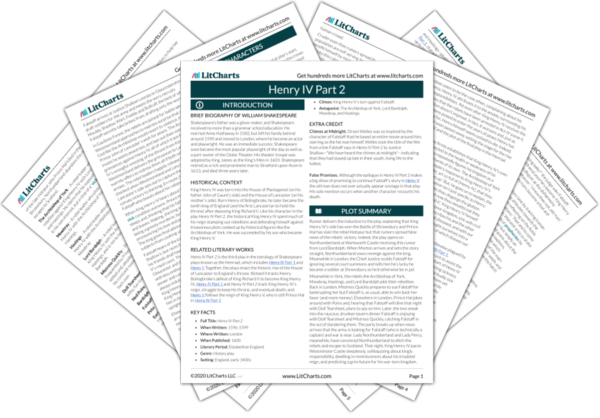Rumor delivers the induction to the play, explaining that King Henry IV’s side has won the Battle of Shrewsbury and Prince Hal has slain the rebel Hotspur but that rumors spread false news of the rebels’ victory. Indeed, the play opens on Northumberland at Warkworth Castle receiving this rumor from Lord Bardolph. When Morton arrives and sets the story straight, Northumberland vows revenge against the king. Meanwhile in London, the Chief Justice scolds Falstaff for ignoring several court summons and tells him he’s lucky he became a soldier at Shrewsbury as he’d otherwise be in jail.
Meanwhile in York, the rebels the Archbishop of York, Mowbray, Hastings, and Lord Bardolph plot their rebellion. Back in London, Mistress Quickly prepares to sue Falstaff for bankrupting her but Falstaff is, as usual, able to win back her favor (and more money). Elsewhere in London, Prince Hal jokes around with Poins and, hearing that Falstaff will dine that night with Doll Tearsheet, plans to spy on him. Later, the two sneak into the raucous, drunken tavern dinner Falstaff is enjoying with Doll Tearsheet and Mistress Quickly, catching Falstaff in the act of slandering them. The party breaks up when news arrives that the army is looking for Falstaff (who is technically a captain) and war is near. Lady Northumberland and Lady Percy, meanwhile, have convinced Northumberland to ditch the rebels and escape to Scotland. That night, King Henry IV paces Westminster Castle sleeplessly, soliloquizing about kingly responsibility, dwelling in reminiscences about his troubled reign, and predicting a grim future for his war-torn kingdom.

Falstaff arrives at Justice Shallow’s estate in Gloucestershire to draft soldiers for the army and meets the sorry recruits Mouldy, Shadow, Wart, Feeble and Bullcalf, the best of which Falstaff secretly take bribes from, drafting only the worst.
In Gaultree Forest, the rebels are poised for battle when Westmoreland approaches to express surprise that a man of God like the Archbishop would resort to violence. He conveys Prince John of Lancaster’s wish for peace. The Archbishop insists he wants peace too, and lays out their extended grievances against Henry IV, all of which trace back to Henry IV’s wrongful wresting of the throne from King Richard. Westmoreland delivers the grievances to Lancaster, who warmly offers to redress them all if both sides disband their armies. The rebel leaders happily release their troops and are shocked when Westmoreland and Lancaster then arrest them. Lancaster’s side sets out to capture the disbanding rebels and convey victory to the king. En route, he runs into dawdling Falstaff who boasts about his valiance.
When King Henry IV hears about the rebels’ defeat, his already sick condition worsens. Prince Hal sits beside his bed as he sleeps and, thinking that his father has died, takes the crown and leaves. Waking, the king is furious and accuses his son of being a greedy murderer, but the prince redeems himself by pronouncing his love and promising he has no lust for power. The king gives final advice—launch foreign wars to distract subjects from cooking up rebellions—then dies.
Falstaff hears of the king's death while dining out at Justice Shallow’s, but races back to London, merrily proclaiming that all his friends shall have their pick of office in his pal King Henry V’s royal court. The princes Lancaster, Clarence, and Gloucester and the Chief Justice, though, face the new king with less enthusiasm, worried that King Henry V will abuse his power and rule England in the same reckless style he has always indulged. They are shocked and impressed, then, when King Henry V proclaims he has put his wild ways behind him. King Henry V applauds the Chief Justice’s strictness towards him in the past and encourages him to stay uncompromisingly upright.
Elsewhere in London, Doll Tearsheet and Mistress Quickly are arrested for murder. Soon after, Falstaff and his friends wait excitedly among the crowds to watch the new king’s procession. When King Henry V approaches, Falstaff hollers endearments, but King Henry V claims not to know Falstaff, calling him a bad dream. He announces he is not the boy he was, and has Falstaff and all his companions arrested and banished. Lancaster ends the play praising his brother’s actions. The king has ensured his old friends will be provided for, even if banished, until they can mend their ways. An epilogue explains Falstaff’s story will resume in the subsequent play.







